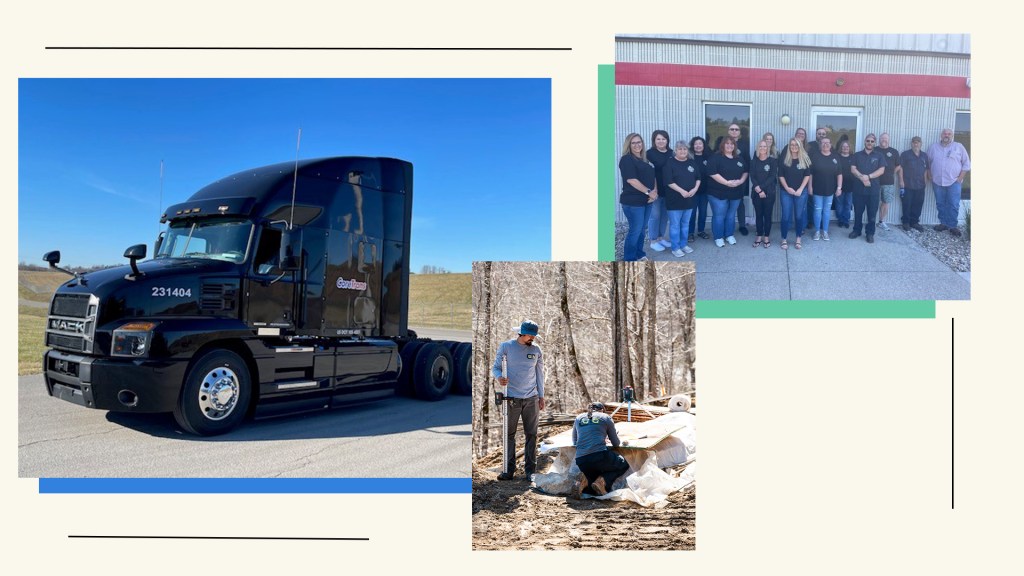
Starting a small business is an exciting yet daunting process—especially when it comes to securing early financing. This can be even more complicated for entrepreneurs in low-income and rural areas of the United States, where large banks may be hesitant to extend loans because they are unfamiliar with the communities and contexts that make an idea special. This is where community development financial institutions (CDFIs) come in: They are banks, credit unions, and loan funds that support local leaders, allowing them to realize their visions, set up their enterprises for strong financial futures, and catalyze job creation and economic growth.
Appalachian Community Capital (ACC) is one such CDFI. It raises funding and directs it to its member CDFIs across the Appalachian region, in 13 states and 423 counties, to provide financial assistance to entrepreneurs and small business owners. ACC and its members focus on supporting small businesses and projects that increase prosperity in under-invested Appalachian regions that have historically experienced economic and social challenges.
By supporting Appalachians who want to bring opportunities to their communities rather than leave the region to find them elsewhere, ACC recognizes that the people best able to build and revitalize communities in Appalachia are Appalachians. Since opening its doors in 2013, ACC has played an important role in constructing the future of the Appalachian region, partnering with more than 30 member institutions to finance new businesses and, in turn, revitalize local economies. ACC launched with a mission to help entrepreneurs and businesses that are creating economic opportunities in a part of America that has struggled due to a loss of industrial jobs, poverty, and public health issues like the opioid crisis, and its work is more timely than ever.
In recent years, ACC has been able to expand its operations—including in 2022, when the organization received a $10 million investment from the Ford Foundation to further the economic enrichment of local communities in Appalachia, including coal-dependent areas. It has since used those funds to help local leaders expand a family-owned trucking business, start a concrete construction and design company, develop cutting-edge healthcare research, and more—a reflection of the remarkable diversity, strength, and potential of the region’s economy. ACC also recently received $500 million from the Environmental Protection Agency’s Clean Communities Investment Accelerator, which will fund renewable energy projects in Appalachia and targeted rural communities across the United States.
“Appalachia is a place full of smart, resilient people who are saying, ‘I love my community, and I want to see it thrive,’” Donna Gambrell, president and CEO of ACC, told Ford. “ACC will use our funding to support projects that make a real difference for people, and to do that, we will engage the community members who’ve probably been thinking a long time about how to solve these problems.”
Now, meet three thriving small businesses in Appalachia, supported by CDFIs that are members of ACC.
CoreTrans
Relationships are the heart of any successful business, but those relationships don’t just exist between the business and its customers. CDFIs in Appalachia can have unique understanding of the historical and local contexts of a family business, and the relationships they build can last through multiple generations. They can also provide extra services like financial planning and general management support. For Brian Whitaker, CEO of CoreTrans—a trucking company based in Somerset, Kentucky—the connection he and his team have with the people at Kentucky Highlands Investment Corporation, a longtime ACC member, goes back more than 20 years and offers far more than just financial support.
Whitaker comes from a three-generation trucking family, and he relies on services like financial planning and general management from Kentucky Highlands to allow him to focus on long-term stability and ensuring good wages for his employees.
CoreTrans was able to replace and update more than 30 trucks with a loan from Kentucky Highlands to the Whitaker Group, which leases equipment to CoreTrans, allowing them to fulfill a year’s worth of much-needed purchases at one time. Now, CoreTrans operates more fuel-efficient trucks with newer technology, which has reduced breakdowns and costly delays for the company’s 105 drivers.
Local lenders also see the value in cultivating these long, trusting relationships with businesses. “We are a conduit to get money on the ground and bring continuity and stability to the cycles of this business, whether it’s through grants or borrowing it from ACC,” said Mark Bolinger, executive vice president of business lending for Kentucky Highlands. “It’s very much old-style relationship lending. You have to have trust with them. They trust us. They value the relationship.” Bolinger grew up in eastern Kentucky, worked in a coal mine after graduating high school, and returned to his hometown to work for Kentucky Highlands after college. “Now I can go back into the communities that I grew up in and I can help all those little businesses, and they can employ some of the people that I know.”
While personal connections to small businesses and a deep understanding of life in eastern Kentucky are a part of what has kept Kentucky Highlands in operation for nearly 60 years, Bolinger knows that there are plenty of communities that could benefit from the attention and support of a CDFI. “We’re only in 22 counties in a state with 120 counties, in a very isolated region in the mountains of southeastern Kentucky. We’ve been working at this for 56 years and still haven’t saturated 22 counties.”
Sue Strunk, CoreTrans’ CFO, knows how valuable the company’s relationship with Kentucky Highlands is—and how important it is for small, regional businesses like CoreTrans to get the personalized care and attention Kentucky Highlands offers businesses in eastern Kentucky. “We’re a very small fish in a large pond,” she said. “With Kentucky Highlands, they make us feel like we mean a whole lot more than that. It has been a partner of ours since day one.”
Cura Concrete
When Kati Salas Montano and Francisco Ceron Maza decided to start a construction company in Asheville, North Carolina, they had a clear goal: to help other members of the Latino community own quality homes, starting them on a path to build wealth and provide opportunities for future generations. And while they knew there would be challenges, they had experience: They’d worked for a local concrete contractor, and they had recently graduated from the architecture school of the University of North Carolina at Charlotte. However, they were rejected by three different lenders before connecting with Mountain BizWorks, an Asheville-based CDFI that serves the 26 westernmost counties in North Carolina—and in 2022, Cura Concrete was born.
While Cura Concrete, a startup from two young entrepreneurs without a lot of their own money to invest, might have looked like a risky investment to some, Mountain BizWorks knew it was exactly the type of business that could benefit from its support. Mountain BizWorks, an ACC member, focuses on working with businesses struggling to find financing from more traditional sources; over 80% of its clients are low-income, women, minority, or rural-based entrepreneurs. It financed a local, Latino-owned cafe where both Salas Montano and Ceron Maza had worked.
“When we connected with Mountain BizWorks, we immediately saw their true investment in the local community,” Salas Montano said. “They do not ignore the social fabric. We were glad to see they have bilingual staff, and they were invested in our background story, but when it came to business, they actively worked to support us as entrepreneurs in Asheville.”
To Mountain BizWorks, Cura Concrete was a perfect example of the type of business that should be getting support from a lender but might struggle because of tired clichés that paint Appalachia as a dying region without many ambitious, creative people to drive local economies. “So many of the entrepreneurs we work with face headwinds—and they would face headwinds even if they were in a bustling metropolis, just because they’re from low-income backgrounds and are starting a business,” said Matt Raker, executive director of Mountain BizWorks. “In Appalachia, those winds are blowing even stronger, it feels like a lot of times, because of the narrative that they’ve got to overcome.”
With their loan from Mountain BizWorks, Cura Concrete was able to buy a new truck and an assortment of steel-ply panels to form concrete walls, both of which proved essential this year as the company landed its biggest job yet: a residential project more than twice the size of their usual assignments. And Salanas Montano and Ceron Maza are proud to be building a name for themselves in the city they moved to as children. They’re also excited to use their experience to help find ways to give back to their neighbors. “We are 100% part of the community in North Carolina and, specifically, Asheville. Most of our lives have been spent in North Carolina,” said Salas Montano. “We want to be aware of challenges faced by our community and work with equally invested groups to design solutions.”
Cohesion Phenomics
While Appalachia is often associated with small towns and heavy industry, some entrepreneurs see it as the perfect place to build cutting-edge healthcare companies. Sumy Joseph is one of these leaders; she’s the founding president and laboratory director of Cohesion Phenomics, an independent genetic testing lab that focuses on diagnosing potentially serious heart conditions and blood vessel abnormalities. She originally came to Spindale, North Carolina, for personal reasons but soon saw great potential in its low overhead, close-knit community, and its location between Asheville and Charlotte.
When Cohesion Phenomics opened in 2013, it had already developed strategic partnerships and collaborations with Harvard Medical School and Fullerton Genetic Center of Mission Hospital in Asheville. When it came time to expand operations and update equipment, she got valuable help from experts at Partner Community Capital, an ACC member CDFI that works across North Carolina and West Virginia.
Partner Community Capital “had connections to our community and region, which meant they were familiar with the healthcare landscape, the strengths, and opportunities unique to the region,” Joseph said. “As we grew and expanded, we were fortunate to receive a loan that allowed us to buy new instrumentation, expand our footprint, and hire more personnel.” The company has also received several NCBiotech grants over the last few years to help fund summer internship programs.
Spencer Blevins, a business lender with Partner Community Capital, is proud of their work with Cohesion. “Supporting entrepreneurs like Sumy is exactly why we do what we do at PCAP. Her commitment to advancing healthcare through genetic testing, all while staying rooted in a small-town community, is a testament to the innovation and resilience we see across Appalachia,” he said. “By helping Cohesion Phenomics expand, we’re not just investing in a business; we’re investing in the health and well-being of the entire region.”
Setting up an independent lab working in genetic testing, a rapidly developing field, would be challenging even in a large city, but Joseph sees her company’s small-town setting, and its work with local healthcare providers, as a part of her mission as a scientist. “My goal is to demystify and simplify this subject so that patients understand the need for genetic testing,” Joseph said. “I believe in making a positive impact on our community by providing education opportunities in genetics and its role in healthcare. Being in a small community, it is very heartening to see the effects of this.”
